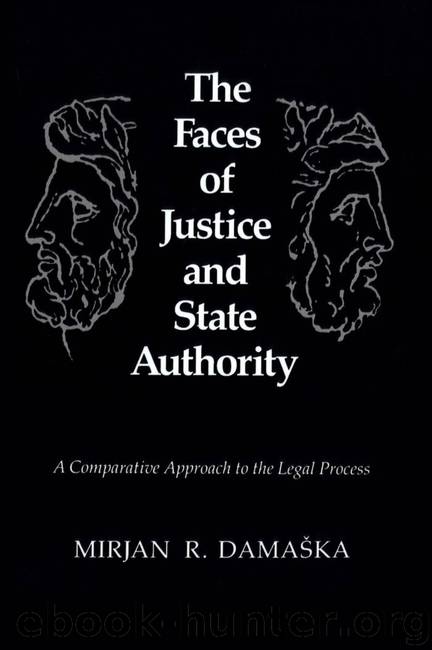The Faces of Justice and State Authority by Mirjan R. Damaska

Author:Mirjan R. Damaska [Damaska, Mirjan R.]
Language: eng
Format: azw3
Publisher: Yale University Press
Published: 1991-07-23T16:00:00+00:00
Content of the Cause
As has been repeatedly pointed out, the policy-implementing process can be initiated independently, without any controversy or existing interpersonal dispute. Indeed, proceedings need not be targeted against any definite person: inquests may be directed toward a general problem, such as the possibility of corruption in an institution. Nor does the disappearance of a dispute which may have initiated the process necessarily signal the end of proceedings: state policy may require that a conflict be provoked or prolonged. The subject matter of the process is thus a recognized state problem that requires official attention and response.
That this state problem should be defined by state officials rather than private citizens is clear, but this is not to deny private individuals a role in shaping the procedural subject matter. Where, as is often the case, an individual grievance gives rise to proceedings, as a rule the aggrieved individual is required to set forth the nature of his complaint. But the purpose of this requirement is only to provide a starting point or preliminary focus for official action; at bottom, an interpersonal dispute is only a symptom of a larger issue whose bounds may well exceed those of the precipitating controversy. An individual’s claim for damages for chemical discharge may be indicative of a broader pollution problem involving a great many people; a complaint of theft from a school can lead to an inquiry into problems of lax security or poor discipline in the educational institution. The greater the state’s appetite for social transformation, the more tenuous and merely provisional becomes the initial contour of the cause, as silhouetted by private parties. In the limiting case of an extremely activist state, the definition of an optimal agenda for the official inquiry is completely divorced from the definition of the problem as originally suggested by the private party’s complaint. In a technocratic setting, the controlling consideration will be notions of forming optimal processing units.19
If the determination of procedural parameters should be in official hands, who precisely is to exercise control? Variations of authority structure will be explored in Chapter 6, but there is a question that deserves immediate attention: does the pure policy-implementing process require that ultimate control over the subject matter of the case be vested in the decision maker, as opposed to some other official?
Part of the question answers itself if one considers the effect of binding the decision maker to only those aspects of the underlying problem put to him by some other participating official. Where the problem is defined by somebody else, the decision maker may be forced to reach a decision against his better judgment. For example, if he cannot extend the inquiry into the question of whether a miscreant is a recidivist, the decision maker may be unable to determine the optimal response to the crime in the light of state correctional policy. The decision maker is therefore authorized to examine all aspects of the event or the transaction brought before him. As the “activist” Frederickian
Download
This site does not store any files on its server. We only index and link to content provided by other sites. Please contact the content providers to delete copyright contents if any and email us, we'll remove relevant links or contents immediately.
| Comparative | Conflict of Laws |
| Customary | Gender & the Law |
| Judicial System | Jurisprudence |
| Natural Law | Non-US Legal Systems |
| Science & Technology |
Future Crimes by Marc Goodman(3002)
American Kingpin by Nick Bilton(2970)
The Meaning of the Library by unknow(2068)
Inside the Middle East by Avi Melamed(1939)
On Tyranny by Timothy Snyder(1858)
Why Nations Fail: The Origins of Power, Prosperity, and Poverty by Daron Acemoglu & James Robinson(1787)
Living Silence in Burma by Christina Fink(1728)
Putin's Labyrinth(1656)
The Mastermind by Evan Ratliff(1591)
Think Like a Rocket Scientist by Ozan Varol(1396)
Law: A Very Short Introduction by Raymond Wacks(1383)
The Smartest Kids in the World by Amanda Ripley(1367)
Leadership by Doris Kearns Goodwin(1349)
The Rule of Law by Bingham Tom(1318)
A Dirty War by Anna Politkovskaya(1313)
It's Our Turn to Eat by Michela Wrong(1301)
Philosophy of law a very short introduction by Raymond Wacks(1297)
Social Media Law in a Nutshell by Ryan Garcia & Thaddeus A Hoffmeister(1249)
Civil Procedure (Aspen Casebooks) by Stephen C. Yeazell(1174)
